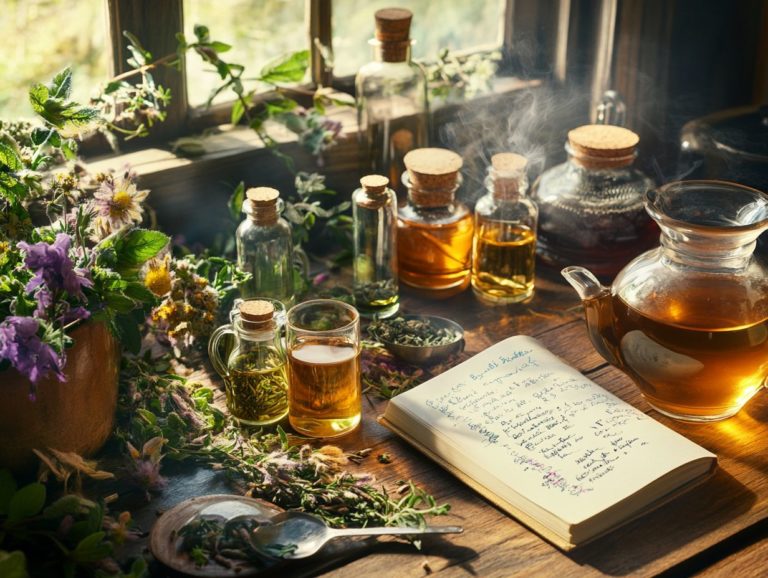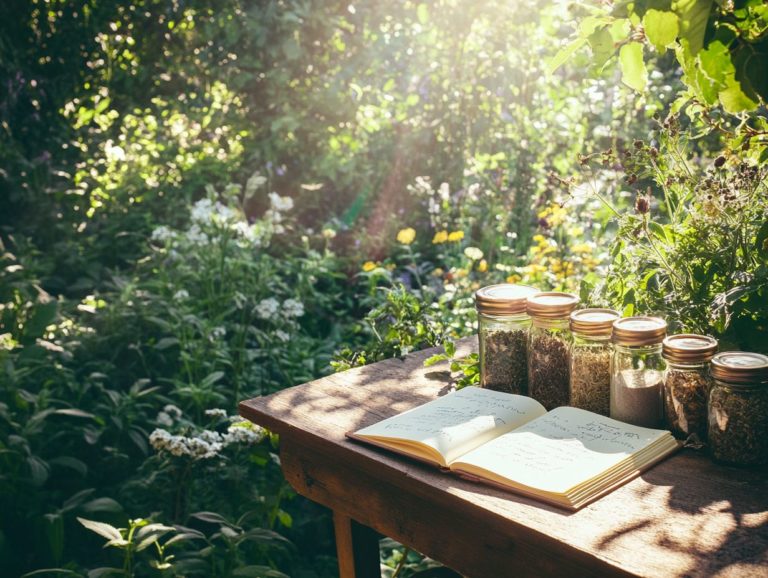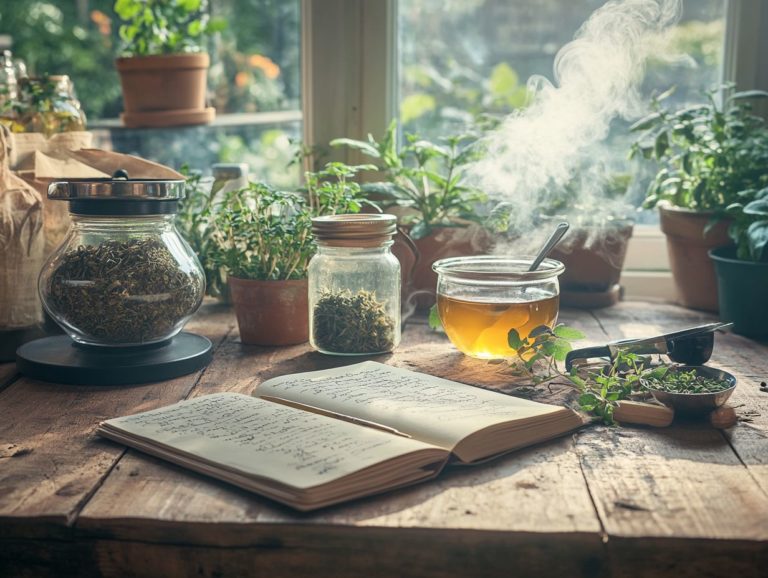How to Measure Herbal Dosages Accurately
Herbal remedies, including those derived from seaweed, are known for their natural healing properties. However, achieving the right herbal dosage is essential for both safety and effectiveness.
Understanding herbal dosages is not merely a matter of guessing; it demands precise measurements. It also requires a keen awareness of various factors that can impact your results. This guide will empower you to master accurate dosages for your herbal remedies!
Whether you re a seasoned herbalist or just starting to explore this intriguing realm of herbal education, you ll learn how to confidently navigate the captivating world of herbal dosages.
Contents
- Key Takeaways:
- Understanding Herbal Dosages
- Why Accurate Measurements are Important
- Methods of Measuring Herbal Dosages
- Factors Affecting Dosage Accuracy
- Tips for Accurate Herbal Dosage Measurements
- Frequently Asked Questions
- What is the best way to measure herbal dosages accurately?
- Can I use a regular kitchen measuring spoon to measure herbal dosages?
- Why is it important to measure herbal dosages accurately?
- What is the difference between weight-based and volume-based measurements for herbal dosages?
- Can herbal dosages vary depending on the form of the herb?
- Is it possible to measure herbal dosages without a scale or measuring tool?
Key Takeaways:
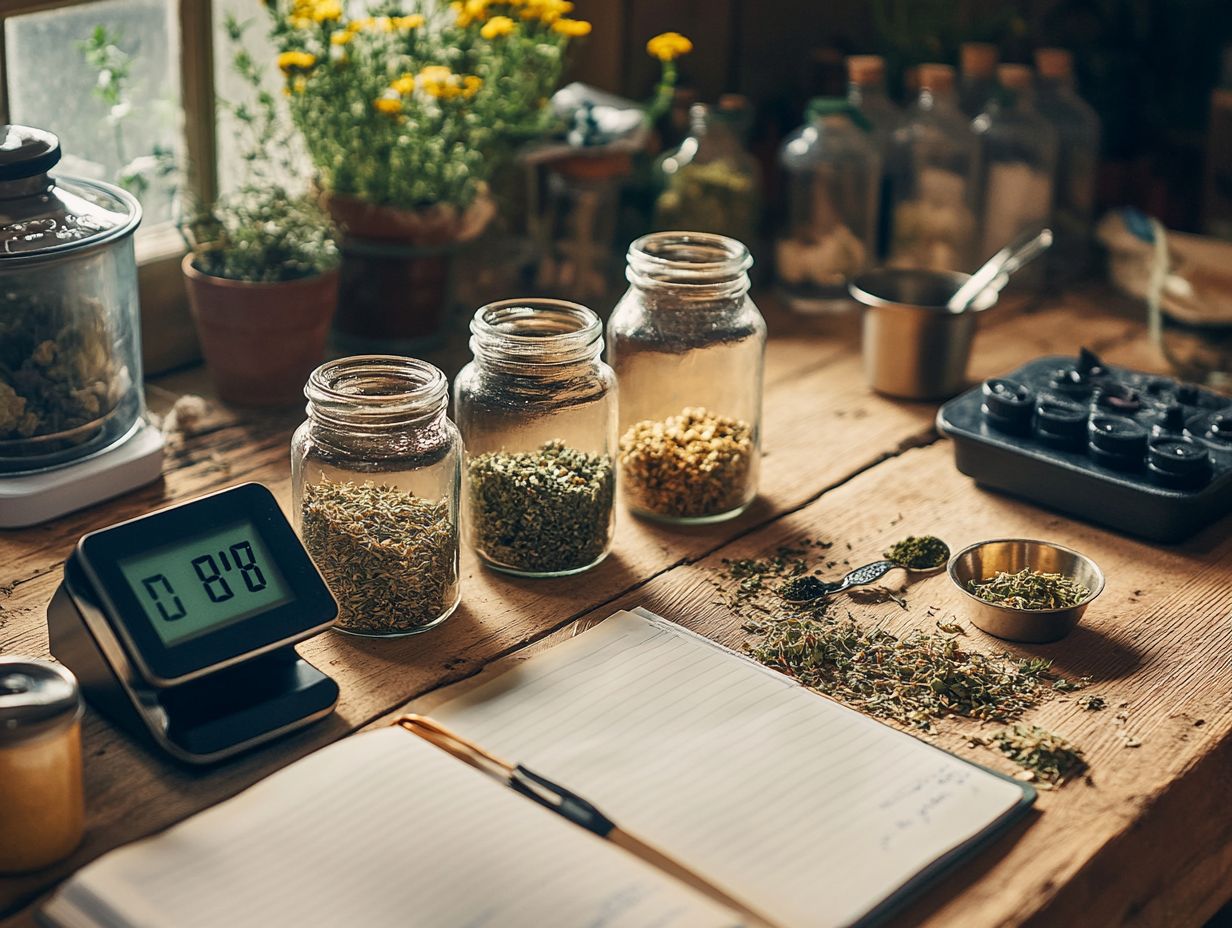
- Accurate herbal dosage measurements are crucial for both safety and effectiveness of herbal remedies.
- Using measuring tools and converting to standard measurements can help ensure precise dosages.
- Quality and freshness of herbs, as well as individual factors, can also impact dosage accuracy.
Understanding Herbal Dosages
Understanding herbal dosages is essential for anyone looking into herbal medicine. Mastering this knowledge ensures you apply herbal extracts and formulas correctly, promotes patient compliance, and maximizes therapeutic effectiveness.
Accurate dosage calculations are vital to prevent toxicity risks while enhancing the healing properties of each herbal treatment. You must consider various factors, such as the strength of the herbal extract and its respective effectiveness, to ensure both safety and efficacy. To avoid pitfalls, be aware of 5 common herbal dosage mistakes, especially when navigating Traditional Chinese Medicine (TCM), a holistic healing system that has been used for thousands of years.
What are Herbal Dosages?
Herbal dosages refer to the precise measurements of herbal extracts or formulas you administer to achieve therapeutic effects. This involves considering various factors such as fixed ratios, strength of the herbal extract, and the nutrient profile of the herbal constituents.
Understanding herbal dosages requires you to take a closer look at the different extraction methods employed, like tinctures, decoctions, and powders. Each method is essential in determining the potency and bioavailability of the herbal compounds. For example, glycerite tinctures, which are created by soaking herbs in glycerin, yield a more concentrated extract compared to herbal decoctions that involve boiling the materials to release their active components. Powders, on the other hand, typically necessitate larger quantities to achieve therapeutic levels due to their lower extraction efficiency.
Dosage equivalency is crucial, as any discrepancies can influence both the safety and effectiveness of treatment. This ensures you receive the optimum benefit without encountering adverse effects.
Why Accurate Measurements are Important
Accurate measurements in herbal medicine are crucial for ensuring patient safety. When dosages are incorrect, the risks of toxicity and reduced efficacy can arise, profoundly affecting the therapeutic index of the herbal remedies you re using.
By ensuring that herbal treatments remain within a defined safety range, you enable medical herbalists to tailor dosages precisely to meet individual patient needs. This approach not only fosters compliance but also optimizes health outcomes, ultimately enhancing the effectiveness of the treatment.
Start your journey to safer and more effective herbal treatments now!
Importance for Safety and Effectiveness
The significance of safety and effectiveness in herbal medicine cannot be overstated. Understanding the therapeutic index the range between effective and harmful doses of herbal formulas is crucial. This knowledge helps prevent toxicity while ensuring the desired healing properties for patients.
This holistic approach emphasizes striking a balance between the benefits and risks inherent in each herbal treatment. As you assess various herbal preparations, consider their unique safety profiles, dosage guidelines, and any potential interactions with other medications.
Take, for example, well-known herbal remedies like echinacea and ginseng. These not only provide immune support and energy boosts but also have established safety records when used correctly. By considering the therapeutic index, you can make informed decisions that benefit your patients.
Ultimately, utilizing prepared herbal formulas requires a respectful understanding of their potential, always prioritizing patient welfare above all else.
Methods of Measuring Herbal Dosages
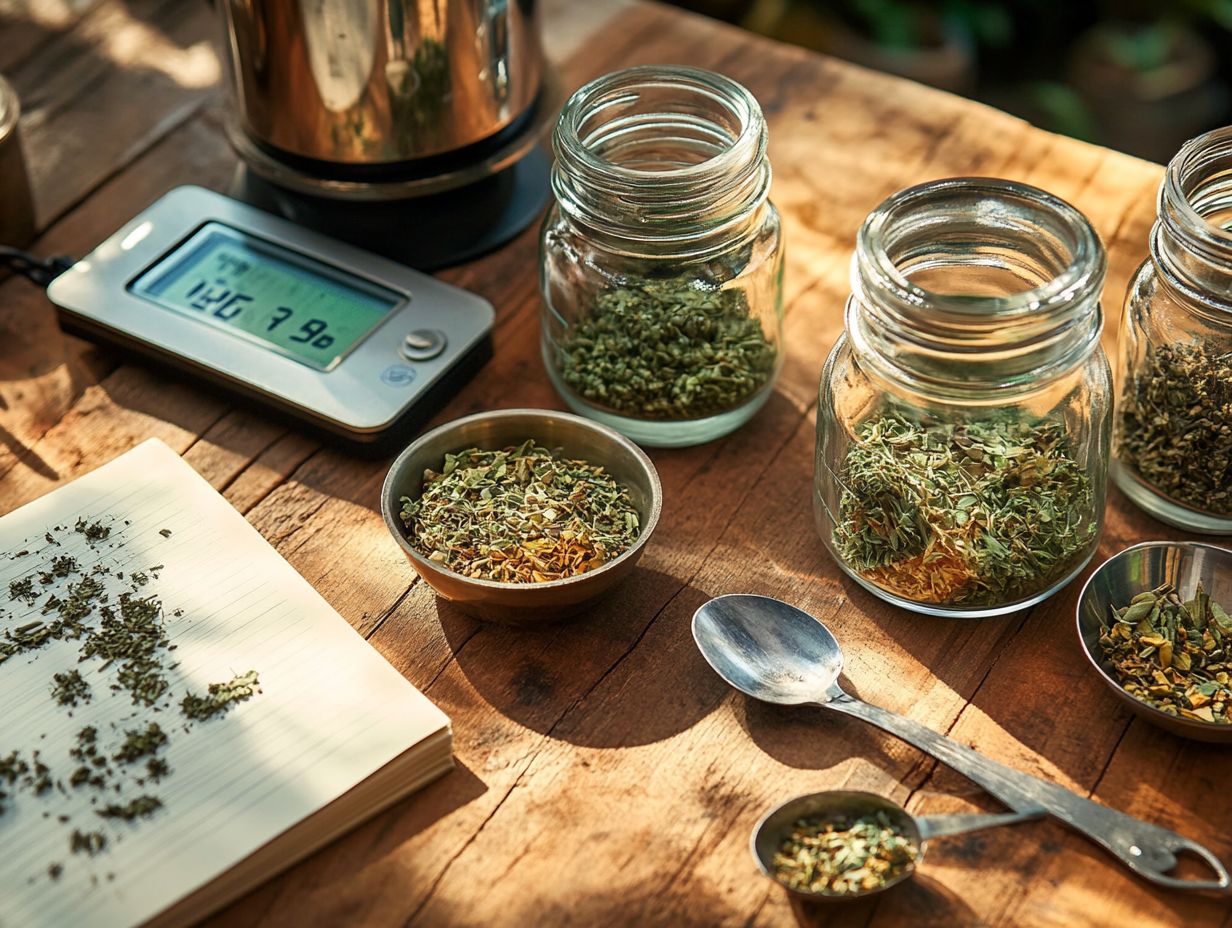
You have several methods for measuring herbal dosages, including dropper measurement techniques for liquid extracts. Utilizing specialized tools like droppers, syringes, and scales enables you to convert herbal extracts into standardized measurements. This ensures precise administration for patients.
Using Measuring Tools
Using the right measuring tools is essential for achieving precise dosing of herbal remedies. Dropper measurements are among the most common methods for administering liquid herbal extracts accurately.
You have a variety of measuring tools at your disposal, each designed for different types of herbal applications, including standard herbal extracts and herbal combinations. Precision scales are invaluable for powdered herbs, while syringes offer a straightforward way to handle liquid formulations. For more detailed information, check out the dosage recommendations for popular herbs.
Each tool serves a distinct purpose, ensuring you administer the correct dosages, which is an absolute necessity for maximizing the effectiveness of treatment plans. For example, using scales to measure powdered herbal blends prevents the risk of under or over-dosing. Similarly, syringes make it easy to administer tinctures accurately, significantly enhancing patient compliance. Additionally, it’s important to refer to herbal remedies: safe dosage for adults and children to ensure safety and effectiveness.
Precise measuring techniques keep patients on track with their treatment plans. For instance, when a patient needs a specific herbal blend for anxiety, accurate measurements ensure they fully reap the benefits of the herbal remedies. To learn more about safe usage, check out understanding herbal dosage.
Converting to Standard Measurements
Converting herbal extracts to standard measurements, including fixed ratios, is essential for achieving the correct dosage and effective treatment. Fixed ratios and accurate conversion methods are crucial for dosage equivalency.
This intricate process begins with identifying the active constituents in the herbal material, which can vary depending on the extraction method and type of extract, whether tinctures or powders. For example, tinctures, liquid extracts made by soaking herbs in alcohol or vinegar, demand precise measurements of both the herb and the solvent to establish a consistent ratio. Understanding recommended dosages is crucial for effective herbal medicine.
On the other hand, powdered extracts are standardized to specific active compounds, ensuring that potency remains uniform across different batches. This standardization is vital for patient compliance. By adhering to established fixed ratios, you can provide patients with reliable and effective treatment options, minimizing variability often associated with natural products. This ultimately enhances the overall therapeutic experience.
Factors Affecting Dosage Accuracy
Several factors can profoundly influence the accuracy of herbal dosages. The quality and freshness of the herbs you choose play a crucial role. Additionally, individual patient characteristics may require tailored adjustments in your herbal treatments.
Quality and Freshness of Herbs
Fresh herbs are nature’s powerhouse! They provide vibrant flavors and powerful health benefits. The quality of herbs influences their active ingredients, directly affecting the effectiveness and safety of your herbal treatments.
When selecting herbs, it’s vital to look for sustainably harvested and organically grown options. These choices often boast higher concentrations of vital compounds.
Fresh herbs can lose potency quickly after harvest. They offer more robust flavors and enhanced therapeutic benefits compared to dried herbs.
Extraction methods, such as tinctures, infusions, or essential oils, are sensitive to the herbs’ quality. If the herbs are of low quality, their effectiveness may be compromised.
To ensure the best quality, seek local suppliers who prioritize freshness. Also, store herbs in a cool, dark place to preserve their properties.
By implementing these measures, you help your herbal remedies maintain their desired potency and therapeutic effects.
Individual Factors
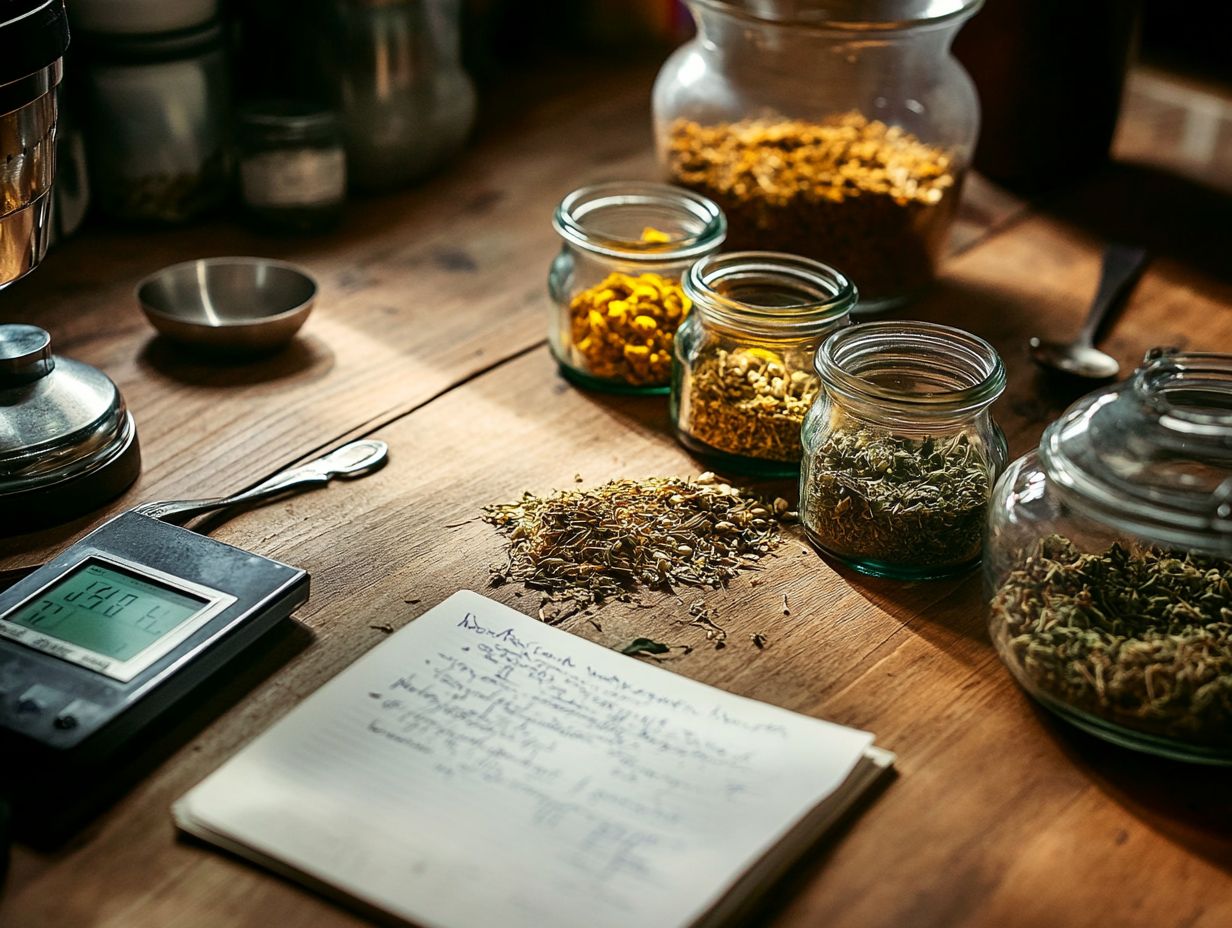
Factors such as age, weight, and health conditions play a crucial role in determining the right dosage for herbal treatments. Tailor adjustments to fit your therapeutic needs.
For example, a middle-aged woman with hypertension may need different dosages for stress management than a younger individual with no conditions. This shows that dosage adjustments are vital.
Studies reveal that individuals with varying metabolic rates respond differently to the same herbal formula. Customizing therapies based on personal characteristics ensures better outcomes.
This personalized approach considers your unique biochemical makeup and lifestyle, leading to more effective and safer treatment outcomes in herbal medicine.
Tips for Accurate Herbal Dosage Measurements
To achieve accurate herbal dosage measurements, follow best practices. Use precise measuring tools and effective storage methods while focusing on patient safety with herbal therapies.
Best Practices for Measuring and Administering
Employ best practices in measuring herbal dosages to ensure safety, enhance compliance, and achieve optimal outcomes. This is particularly important for dosage calculations and precise dosing.
For practitioners, measurement accuracy is critical. Even slight discrepancies can change effectiveness. Use calibrated measuring devices like graduated cylinders or droppers for precise dosages.
Proper administration techniques timing and method of intake, whether through tinctures, decoctions, or capsules maximize absorption and therapeutic benefits. Educating patients on these practices makes them active participants in their health journey.
When you explain the reasons behind each measure clearly, you enhance their understanding and adherence to treatment plans, ensuring safety and effectiveness in herbal therapies, including how environment affects herbal dosage safety.
Frequently Asked Questions
What is the best way to measure herbal dosages accurately?
The best way to measure herbal dosages is by using a scale designed for herbs. This ensures you get the correct and consistent amount every time.
Can I use a regular kitchen measuring spoon to measure herbal dosages?
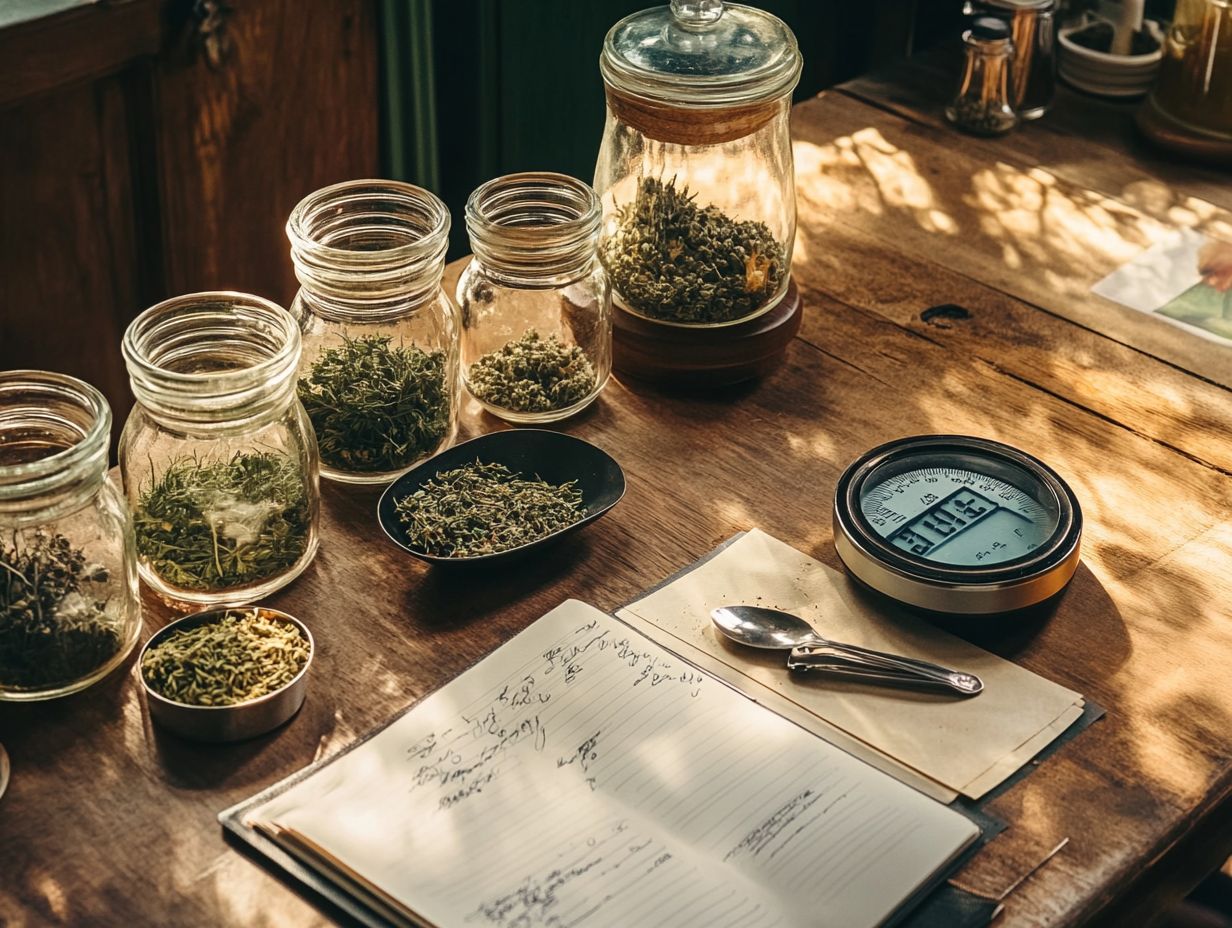
No, using a regular kitchen measuring spoon is not recommended for herbal dosages. These spoons can vary in size and may lead to inaccurate measurements.
Use a scale designed for measuring herbs or a dropper to measure liquid herbal extracts accurately.
Why is it important to measure herbal dosages accurately?
Herbal dosages are prescribed for specific health benefits. Using the correct amount is crucial to achieve the desired effects.
Accurate measuring helps you avoid consuming too much or too little, which can negatively impact your health.
What is the difference between weight-based and volume-based measurements for herbal dosages?
Weight-based measurements measure the actual weight of the herb. Volume-based measurements consider the volume, which can vary in consistency.
Weight-based methods are more accurate, especially for powder and concentrated extracts.
Can herbal dosages vary depending on the form of the herb?
Yes, the form of the herb affects its dosage. For instance, powdered herbs and liquid extracts like Galenical extracts have different dosage requirements.
Always follow the recommended dosage for the specific form of the herb you are using to ensure safety.
Is it possible to measure herbal dosages without a scale or measuring tool?
While not ideal, you can measure herbal dosages without a scale. This method, known as the “pinch” method, lacks precision.
For safety, fixed ratios are crucial for accurate dosage adjustments.

